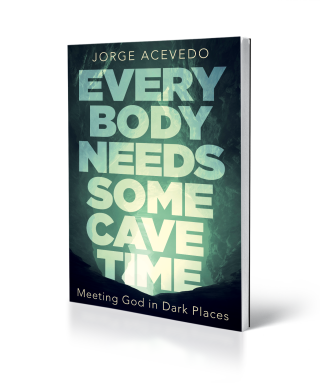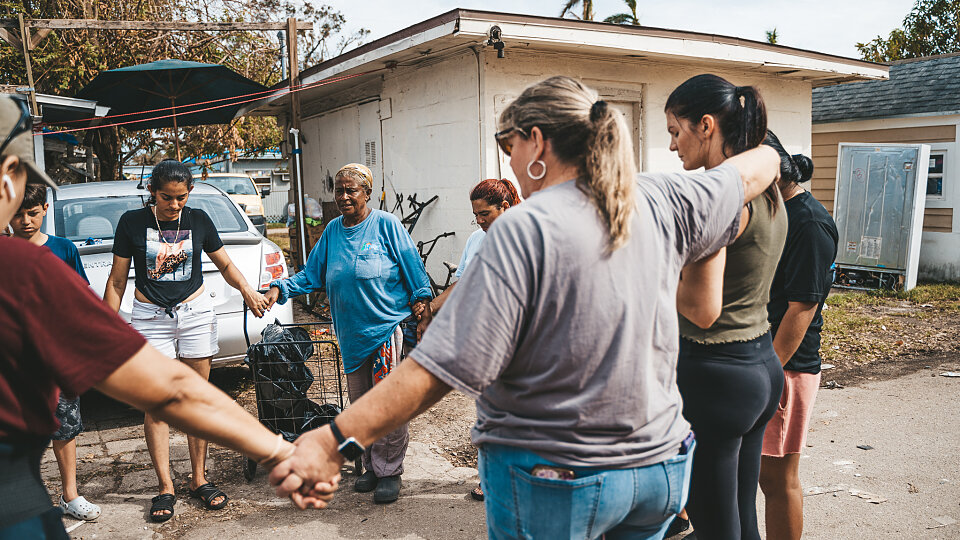Cave Time in Southwest Florida after Hurricane Ian
On Wednesday, September 28, 2022, Hurricane Ian, considered by many to be the most destructive hurricanes in more than 90 years, made landfall in our Southwest Florida paradise. My wife Cheryl and I along with our two young sons had made Cape Coral and North Fort Myers our home 26 years earlier in August, 1996 when I came to Grace Church as a first time Lead Pastor. Our 26 plus years here have been a gift even with a half-dozen hurricanes that have either hit us directly or skirted by leaving differing degrees of damage and destruction.
In the afternoon of the 28th, the category 4 hurricane came ashore near Cayo Costa with sustained winds of 150 miles per hour. Ian’s intense winds, heavy rainfall, and catastrophic storm surges devastated our beautiful barrier islands of Fort Myers Beach, Sanibel, Captiva and Pine Island. The 12-to-18-foot above ground level storm surge destroyed our vacation wonderland. To date, tens of billions of dollars’ worth of property damage has been accounted and more sadly, more than 100 precious people lost their lives. This has been our communities collect cave time.
On the second Sunday after the hurricane, the original campus of Grace Church where I pastor got electricity and so we gathered for worship in our Sanctuary. There was no air conditioning because the units had been damaged so we opened the front doors and worshipped the way most of the world worships…with the music and preaching blaring from the Sanctuary into the neighboring streets. I felt like I was in Cuba or India again. The Sanctuary itself was filled with pallets of food, cleaning supplies, baby diapers, tarps and much more. As worship was beginning, I thought to myself, “People and pallets! Now that’s worship!”
When my colleague and co-Lead Pastor, Wes Olds stood to welcome the crowd, the place exploded in rapturous applause and shouts. There was a collective “hallelujah.” Seldom if ever in my more than a quarter century worshipping in that space with these people have I heard our people engage in worshipping our God so passionately. The place was electric with a combination of the Holy Spirit’s presence and our people’s brokenness. Then I rose to lead my part of our worship experience. Earlier in the week, our worship team discerned that we needed to communally grieve for our losses during Hurricane Ian so I led our people in a lament. This was my introduction to that experience of corporate lament:
Every loss in life has to be grieved. Let that sink in. Every loss in life whether it’s the loss of a person or the loss of a piece of property has to be grieved.
You see, ungrieved losses leave us dis-eased…diseased. These buried bombs linger just beneath the surface of our lives waiting for the most inopportune time to detonate not only taking us out, but a whole host of collateral damage, primarily the people we love most. Ungrieved losses are deadly for our souls.
The wisdom of the Book of Psalms, the prayer and worship book of the Bible is that one-third of them are what are called “Laments.” They are raw and gritty. They make is blush at their honesty. These lament psalms “name names.” They are unfiltered. When the author is mad at God, he says it. When there is doubt, she speaks it. The object of anger and disappointment is named and unearthed. Psalms of lament name the grief before God. These lament psalms are like spiritual bomb squads who disable the explosive material buried deep in our souls.
In one particular season of the Jewish people’s history, they found themselves in exile. Israel was their land. It was their home. Jerusalem, the City of David, was the treasured place that three times a year, they would travel to, to make worship offerings to Yahweh. All of that was taken away. Defeated by the great Babylonian army, they were marched nearly 1700 miles from the Promised Land to their new homes in Babylon. How could they worship their God in a foreign land? Back home, their Temple lay in ruins much like many of our Ian-demolished homes here in Lee County. Grieving, the psalm writer of Psalm 137 names their grief when he wrote these words:
By the rivers of Babylon we sat and wept
when we remembered Zion.
There on the poplars
we hung our harps,
for there our captors asked us for songs,
our tormentors demanded songs of joy;
they said, “Sing us one of the songs of Zion!”
How can we sing the songs of the Lord
while in a foreign land?
Now, I chose a portion of a psalm of lament that is “tame.” I’d invite you to go home and read the last verse, verse 9 of Psalm 137 to see the unfiltered anger of this unknown worship leader.
The beauty of almost every psalm of lament in the Book of Psalms, and remember that about 50 of the 150 psalms are laments, is that they end in doxology or praise. They begin with the unfiltered naming of our losses and end with adoration and praise of our good and great God.
So with this in mind and in light of the last almost two weeks of terror in our Southwest Florida paradise, let’s together name before God our losses. Here’s what we will do. I will name a common loss that we all have experienced because of Hurricane Ian and after each lament, I’ll invite you to pray, “God of comfort, hear our prayers.” Following this will be a few moments of silence for you to pray. Then we will name another loss. So let’s begin.
And with that, I offered prayers on behalf of our people for loss of life, homes, possessions, normalcy, proximity to one another, school and activities for our children, jobs and income and the beauty of our natural vacation wonderland. This was followed by the congregation declaring loudly and passionately, “God of comfort, hear our prayers.” The silence afterward as everyone prayed was gripping and consoling. This experience of congregational lament brought healing to our wounded souls. You see, God met us in our dark place on Sunday, October 9, 2022 in the aftermath of Hurricane Ian.
This is the main reason I am so excited about my new book Every Body Needs Some Cave Time: Finding God in Dark Places. God has an amazing capacity to show up and even show off in dark seasons of our lives. In the book, we will journey with six biblical character to literal caves that I have connected to a dark season in a biblical character’s life. They are the dark seasons of anger, fear, depression, temptation, grief and hopelessness. We end the book in the cave of Easter resurrection. We journey with women and men like Samson, David, Elijah, Mary and Martha, Mary Magdalene and Jesus. In each story, I seek to connect it with our 21st century challenges of following Jesus when life gets messy, hard and gloomy.
Recently, I asked a friend, Carolyn Moore to read and endorse the book via a text. She texted me back this response:
I've been on a terror lately about darkness and God. The Message translates Psalms 139:12 this way: “Then I said to myself, ‘Oh, he even sees me in the dark! At night I’m immersed in the light!’ It’s a fact: darkness isn’t dark to you; night and day, darkness and light, they’re all the same to you.” I’m in love with that little revelation: “Oh, he even sees me in the dark!” So I’m gonna be so ready to read your take on dark places.
Yes Carolyn, God does see us in the dark. God meets us in the dark and God does some of his best work in these dark places.

